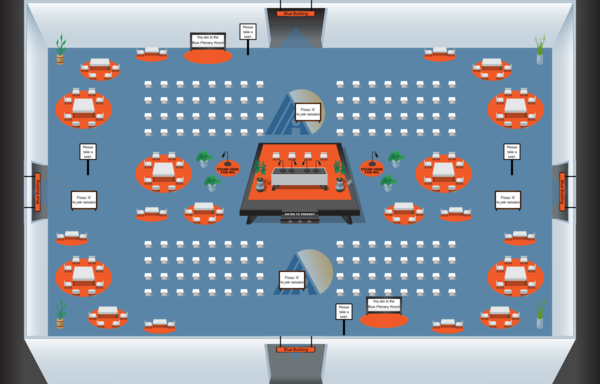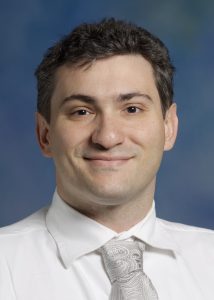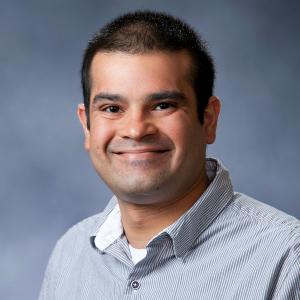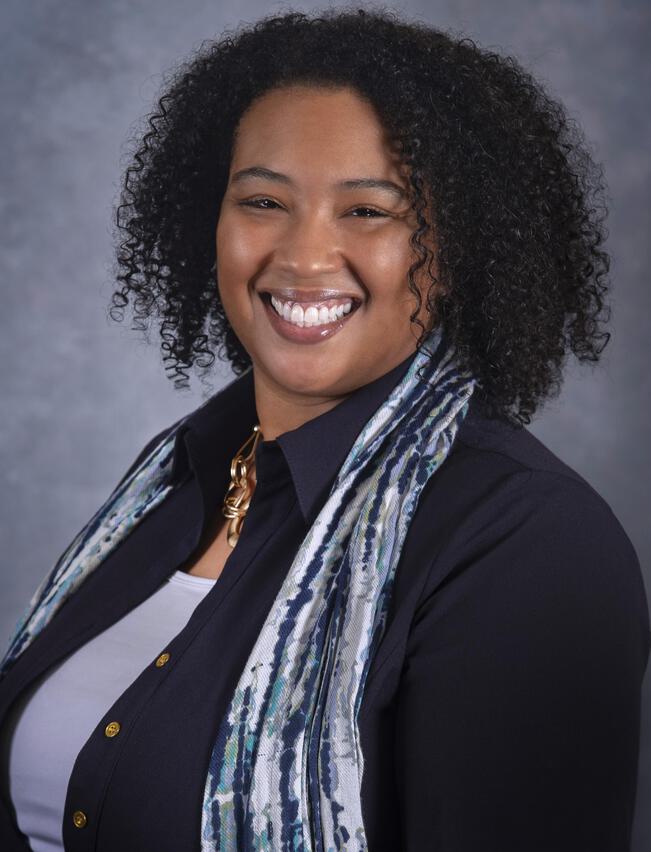Plenary

Attendees in both buildings of the AAAI-22 virtual venue will be able to view and participate in all plenary sessions described below. Session Chairs and speakers have been informed in advance whether each activity is held via livestream or Zoom and can provide guidance to the audience accordingly. We encourage all participants to take advantage of the live chat options available to them in the virtual venue to propose questions or show their enthusiasm for a particular topic.
Opening Ceremony and Conference Awards
 Katia Sycara, Vasant Honavar, Matthijs Spaan, Mark Boddy, Meinolf Sellman, Michael Guerzhoy, Marion Neuman
Katia Sycara, Vasant Honavar, Matthijs Spaan, Mark Boddy, Meinolf Sellman, Michael Guerzhoy, Marion Neuman
 Thu, February 24 2:30 PM - 3:30 PM (+00:00)
Thu, February 24 2:30 PM - 3:30 PM (+00:00) Red Plenary Room, Blue Plenary Room
Red Plenary Room, Blue Plenary Room
Add to Calendar
Apple
Google
iCal File
Microsoft 365
Outlook.com
Yahoo
Opening Ceremony and Conference Awards

Presidential Address: The State of AI

 Bart Selman
Bart Selman
We are witnessing a highly accelerated phase of progress in AI, largely due to the deep learning revolution. This revolution is also reunifying our field, with researchers building bridges across different research areas, such as computer vision, natural language understanding, and decision making. In this work, we see significant progress on the big questions that have challenged our field since its inception. I will review the current state of AI and outline challenges that need to be addressed to develop genuinely robust and reliable AI systems. I postulate that the next level of AI will require an integration of the highly successful data-driven paradigm with a knowledge-driven approach coupled with human feedback for human-aligned intelligent systems.
 Thu, February 24 3:30 PM - 4:45 PM (+00:00)
Thu, February 24 3:30 PM - 4:45 PM (+00:00) Red Plenary Room, Blue Plenary Room
Red Plenary Room, Blue Plenary Room
Add to Calendar
Apple
Google
iCal File
Microsoft 365
Outlook.com
Yahoo
Presidential Address: The State of AI

The Data-Centric AI (IAAI-22 Robert S. Engelmore Memorial Lecture Award)

 Andrew Ng (DeepLearning AI, Landing AI, and Coursera)
Andrew Ng (DeepLearning AI, Landing AI, and Coursera)
Data-Centric AI (DCAI) represents the recent transition from focusing on modeling to the underlying data used to train and evaluate models. Increasingly, common model architectures have begun to dominate a wide range of tasks, and predictable scaling rules have emerged. While building and using datasets has been critical to these successes, the endeavor is often artisanal — painstaking and expensive. The community lacks high productivity and efficient open data engineering tools to make building, maintaining, and evaluating datasets easier, cheaper, and more repeatable. In the presentation, Dr. Ng will talk about what DCAI is, the challenges, and tips for using the DCAI approach.
 Thu, February 24 8:00 PM - 9:00 PM (+00:00)
Thu, February 24 8:00 PM - 9:00 PM (+00:00) Red Plenary Room, Blue Plenary Room
Red Plenary Room, Blue Plenary Room
Add to Calendar
Apple
Google
iCal File
Microsoft 365
Outlook.com
Yahoo
The Data-Centric AI (IAAI-22 Robert S. Engelmore Memorial Lecture Award)

AAAI Organizational Awards Ceremony
 Bart Selman, Yolanda Gil
Bart Selman, Yolanda Gil
 Thu, February 24 10:00 PM - 11:00 PM (+00:00)
Thu, February 24 10:00 PM - 11:00 PM (+00:00) Red Plenary Room, Blue Plenary Room
Red Plenary Room, Blue Plenary Room
Add to Calendar
Apple
Google
iCal File
Microsoft 365
Outlook.com
Yahoo
AAAI Organizational Awards Ceremony

Interpretable Machine Learning: Bringing Data Science Out of the “Dark Age” (Recipient of the 2022 AAAI Squirrel Award for for Artificial Intelligence for the Benefit of Humanity)

 Cynthia Rudin (Duke University)
Cynthia Rudin (Duke University)
With widespread use of machine learning, there have been serious societal consequences from using black box models for high-stakes decisions in criminal justice, healthcare, financial lending, and beyond. Interpretability of machine learning models is critical when the cost of a wrong decision is high. Throughout my career, I have had the opportunity to work with power engineers, doctors, and police detectives. Using interpretable models has been the key to allowing me to help them with important high-stakes societal problems. Interpretability can bring us out of the “dark” age of the black box into the age of insight and enlightenment.
 Thu, February 24 11:30 PM - Fri, February 25 12:30 AM (+00:00)
Thu, February 24 11:30 PM - Fri, February 25 12:30 AM (+00:00) Red Plenary Room, Blue Plenary Room
Red Plenary Room, Blue Plenary Room
Add to Calendar
Apple
Google
iCal File
Microsoft 365
Outlook.com
Yahoo
Interpretable Machine Learning: Bringing Data Science Out of the “Dark Age” (Recipient of the 2022 AAAI Squirrel Award for for Artificial Intelligence for the Benefit of Humanity)

Funding Panel
 Marc Steinberg, David Boothe, Cecile Huet, Doug Riecken, Henry Kautz, Tom Kalil, Bo Xu
Marc Steinberg, David Boothe, Cecile Huet, Doug Riecken, Henry Kautz, Tom Kalil, Bo Xu
 Fri, February 25 3:30 PM - 4:45 PM (+00:00)
Fri, February 25 3:30 PM - 4:45 PM (+00:00) Red Plenary Room, Blue Plenary Room
Red Plenary Room, Blue Plenary Room
Add to Calendar
Apple
Google
iCal File
Microsoft 365
Outlook.com
Yahoo
Funding Panel

Toward an AI Network for Trustworthy AI

 Gil Alterovitz
Gil Alterovitz
Trustworthy AI is being enabled by new federal strategies, policies, and collaborative possibilities – bringing to bear a new paradigm. AI also brings the promise of better and more efficient care, especially for our nation’s Veterans. This session will share several use cases from the work of the National Artificial Intelligence Institute (NAII) at the VA and collaborations, including pilots that empower Veterans to take control of medication adherence, physicians to evaluate COVID-19-associated prognosis and needs, and VHA staff to triage text-based input to quickly identify and assist Veterans in crisis. Establishing an AI network to scale up such research and development will also be covered.
 Fri, February 25 8:30 PM - 9:30 AM (+00:00)
Fri, February 25 8:30 PM - 9:30 AM (+00:00) Red Plenary Room, Blue Plenary Room
Red Plenary Room, Blue Plenary Room
{
"name":"Toward an AI Network for Trustworthy AI",
"description":"",
"startDate":"02-25-2022",
"endDate":"02-25-2022",
"startTime": "12:30",
"endTime": "01:30",
"location": "Red Plenary Room, Blue Plenary Room",
"timeZone": "US/Pacific",
"options":[
"Apple",
"Google",
"iCal",
"Microsoft365",
"Outlook.com",
"Yahoo"
]
}
Toward an AI Network for Trustworthy AI

Advancing Agricultural Genome to Phenome Research (AAAI-22 Invited Talk)

 Patrick S. Schnable (Iowa State University)
Patrick S. Schnable (Iowa State University)
Our goal is to develop statistical models that will predict crop performance in diverse environments. Crop phenotypes such as yield and drought tolerance are controlled by genotype, environment and their interactions. The necessary volumes of phenotypic data, however, remain limiting and our understanding of the interaction between genotypes and environments is limited. To address this limitation, we are building new sensors and robots to automatically collect large volumes of phenotypic data.
 Fri, February 25 11:30 PM - Sat, February 26 12:30 AM (+00:00)
Fri, February 25 11:30 PM - Sat, February 26 12:30 AM (+00:00) Red Plenary Room, Blue Plenary Room
Red Plenary Room, Blue Plenary Room
Add to Calendar
Apple
Google
iCal File
Microsoft 365
Outlook.com
Yahoo
Advancing Agricultural Genome to Phenome Research (AAAI-22 Invited Talk)

Safety and Robustness for Deep Learning with Provable Guarantees (AAAI-22 Invited Talk)

 Marta Kwiatkowska (University of Oxford)
Marta Kwiatkowska (University of Oxford)
Computing systems are becoming ever more complex, with automated decisions increasingly often based on deep learning components. A wide variety of applications are being developed, many of them safety-critical, such as self-driving cars and medical diagnosis. Since deep learning is unstable with respect to adversarial perturbations, there is a need for rigorous software development methodologies that encompass machine learning components. This lecture will describe progress with developing automated certification techniques for learnt software components to ensure safety and adversarial robustness of their decisions, including discussion of the role played by Bayesian learning and causality.
 Sat, February 26 3:30 PM - 4:30 PM (+00:00)
Sat, February 26 3:30 PM - 4:30 PM (+00:00) Red Plenary Room, Blue Plenary Room
Red Plenary Room, Blue Plenary Room
Add to Calendar
Apple
Google
iCal File
Microsoft 365
Outlook.com
Yahoo
Safety and Robustness for Deep Learning with Provable Guarantees (AAAI-22 Invited Talk)

AI Institutes Panel







 Adam Klivans (University of Texas at Austin), Jesse Thaler (Massachusetts Institute of Technology), Huimin Zhao (University of Illinois at Urbana-Champaign), Amy McGovern (University of Oklahoma), Ilias Tagkopoulos (University of California, Davis), Vikram Adve (University of Illinois at Urbana-Champaign), Sydney D’Mello (University of Colorado Boulder)
Adam Klivans (University of Texas at Austin), Jesse Thaler (Massachusetts Institute of Technology), Huimin Zhao (University of Illinois at Urbana-Champaign), Amy McGovern (University of Oklahoma), Ilias Tagkopoulos (University of California, Davis), Vikram Adve (University of Illinois at Urbana-Champaign), Sydney D’Mello (University of Colorado Boulder)
The U.S. National Science Foundation has established the Artificial Intelligence Research Institutes awards in 2020.
These Institutes represent the nation's most significant federal investment in AI research and education to date.
The panelists will present their Institute’s research vision and results.
Moderator: Vasant Honavar, Technical Program co-Chair, AAAI-2022.
NSF AI Institutes Awards from 2020
● Foundations of Machine Learning: Adam Klivans
● Artificial Intelligence and Fundamental Interactions: Jesse Thaler
● Molecular Discovery, Synthetic Strategy, and Manufacturing: Huimin Zhao
● Trustworthy AI in Weather, Climate, and Coastal Oceanography: Amy McGovern
● Food systems: Ilias Tagkopoulos
● Future Agricultural Resilience, Management and Sustainability: Vikram Adve
● Student-AI Teaming: Sydney D’Mello
 Sat, February 26 8:15 PM - 9:30 PM (+00:00)
Sat, February 26 8:15 PM - 9:30 PM (+00:00) Red Plenary Room, Blue Plenary Room
Red Plenary Room, Blue Plenary Room
Add to Calendar
Apple
Google
iCal File
Microsoft 365
Outlook.com
Yahoo
AI Institutes Panel

You Know AI Has Arrived When We’re Teaching It In Elementary School (AAAI/EAAI Outstanding Educator Award)




 David Touretzky (Carnegie Mellon University), Christina Gardner-McCune (University of Florida), Fred Martin (University of Massachusetts Lowell), and Deborah Seehorn
David Touretzky (Carnegie Mellon University), Christina Gardner-McCune (University of Florida), Fred Martin (University of Massachusetts Lowell), and Deborah Seehorn
In mid-2018 we launched the AI4K12 initiative (AI4K12.org) to develop national guidelines for teaching AI in K-12. The AI4K12 Working Group produced a list of “Five Big Ideas in AI” that has influenced views world-wide about what students should know about AI. We are now releasing detailed grade band progression charts for each big idea as guidance for curriculum developers. AI4K12.org is also working with education departments in 15 states and 2 US territories to help them incorporate AI into their K-12 curriculum standards. In this talk we’ll share what AI looks like in elementary school and beyond.
 Sun, February 27 4:30 PM - 5:30 PM (+00:00)
Sun, February 27 4:30 PM - 5:30 PM (+00:00) Seminar Room
Seminar Room
Add to Calendar
Apple
Google
iCal File
Microsoft 365
Outlook.com
Yahoo
You Know AI Has Arrived When We’re Teaching It In Elementary School (AAAI/EAAI Outstanding Educator Award)

Gathering Strength, Gathering Storms: The One Hundred Year Study on Artificial Intelligence (AI100) 2021 Study Panel Report (AAAI 2022 Invited Talk)

 Michael Littman (Brown University)
Michael Littman (Brown University)
The One Hundred Year Study on Artificial Intelligence (AI100) is a long-term investigation of the field of AI and its influences on people, their communities, and society. With oversight from a standing committee administered out of Stanford University, the AI100 convenes a study panel every 5 years with the goal of issuing a report accessible to AI researchers, policy makers, industry leaders, and the public at large. The reports describe the technical and societal challenges and opportunities that have arisen since the previous report and envision potential future advances. This talk will summarize the 2nd report, issued September 2021.
 Sun, February 27 3:30 PM - 4:30 PM (+00:00)
Sun, February 27 3:30 PM - 4:30 PM (+00:00) Red Plenary Room, Blue Plenary Room
Red Plenary Room, Blue Plenary Room
Add to Calendar
Apple
Google
iCal File
Microsoft 365
Outlook.com
Yahoo
Gathering Strength, Gathering Storms: The One Hundred Year Study on Artificial Intelligence (AI100) 2021 Study Panel Report (AAAI 2022 Invited Talk)

Thinking Fast and Slow in AI (AAAI 2022 Invited Talk)

 Francesca Rossi (IBM Research)
Francesca Rossi (IBM Research)
Current AI systems lack several important human capabilities, such as adaptability, generalizability, self-control, consistency, common sense, and causal reasoning. We believe that existing cognitive theories of human decision making, such as the “thinking fast and slow” theory, can provide insights on how to advance AI systems towards some of these capabilities. In this talk, I will describe a general architecture that is based on fast/slow solvers and a metacognitive component. I will then present experimental results on the behavior of an instance of this architecture, for AI systems that make decisions about navigating in a constrained environment. I will show how combining the fast and slow decision modalities allows this system to evolve over time and gradually pass from slow to fast thinking with enough experience, and that this greatly helps in decision quality, resource consumption, and efficiency.
 Sun, February 27 11:30 PM - Mon, February 28 12:30 AM (+00:00)
Sun, February 27 11:30 PM - Mon, February 28 12:30 AM (+00:00) Red Plenary Room, Blue Plenary Room
Red Plenary Room, Blue Plenary Room
Add to Calendar
Apple
Google
iCal File
Microsoft 365
Outlook.com
Yahoo
Thinking Fast and Slow in AI (AAAI 2022 Invited Talk)
